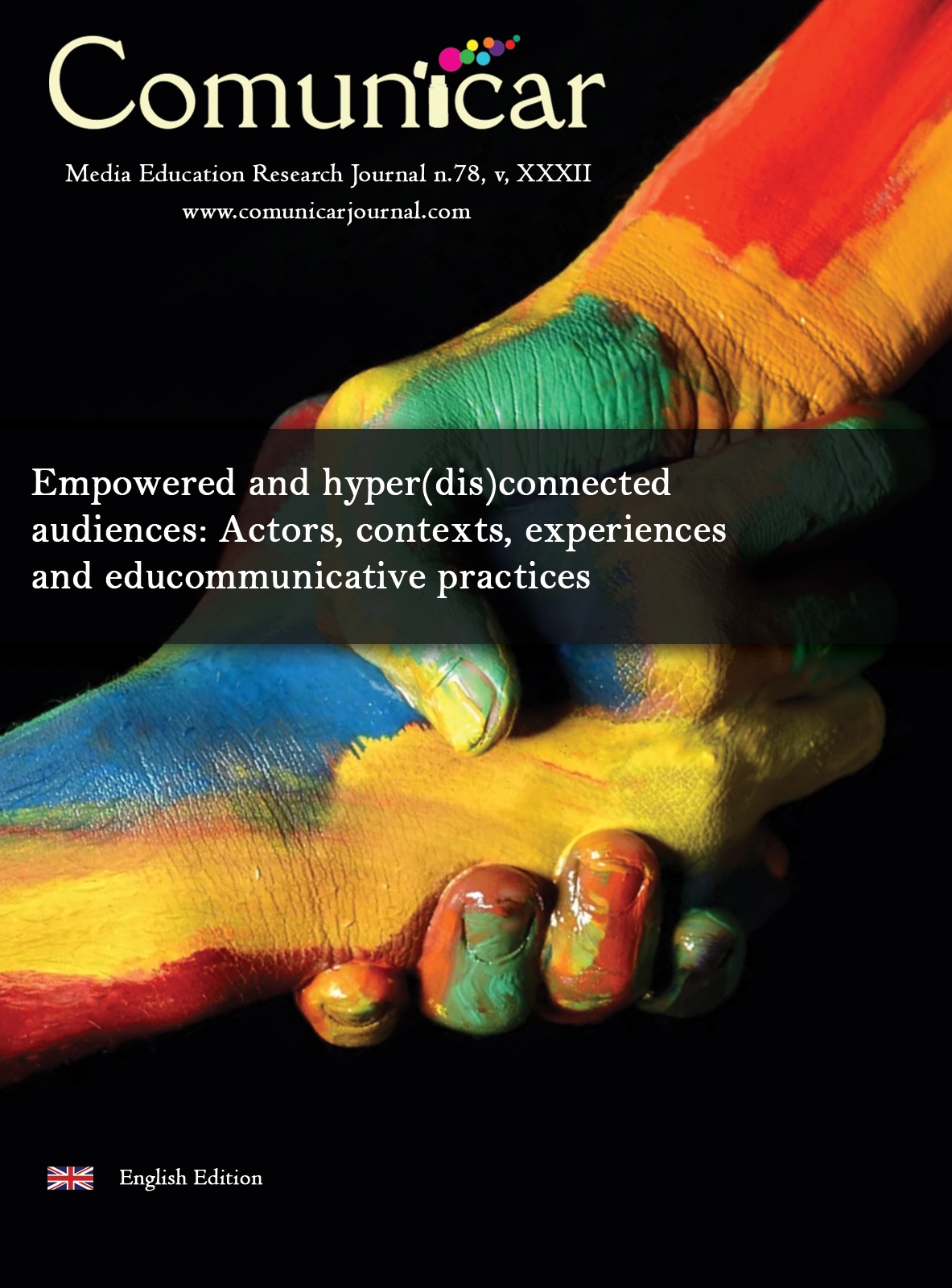数字时代拉丁美洲教授的研究文化
IF 5.1
1区 文学
Q1 COMMUNICATION
引用次数: 5
摘要
全球卫生危机(COVID-19)造成的社会限制进程迫使教授们承担新的研究能力,使他们能够提高科学指标,并为拉丁美洲地区数字时代的研究文化做出贡献。本文分析了数字时代20个国家的拉丁美洲教授的研究文化,以及他们与1996年至2019年被期刊引文报告(JCR)收录的科学论文产量的关系。从5个国际科学活动中选出2215名教授进行了李克特式问卷调查(包含效度和信度标准)。主要结果表明:78%的教授教学经验不足15年,年龄在44岁以下,38.9%的教授具有本科学历,62.5%的教授回答从未在索引期刊上发表过论文,不知道范式和研究设计的正确应用。另一方面,自引占总被引量的23.86%。因此,研究结果反映了教授的研究文化与拉丁美洲科学产出之间的显著关系。最后,拉丁美洲的教授发现,他们所处的经济、政治和社会环境影响了良好的研究和科学出版实践,在新的数字时代留下了研究能力方面的培训缺口。《新冠肺炎社会问题监测进程》、《新冠肺炎社会问题监测进程》、《新冠肺炎调查能力监测进程》、《新冠肺炎调查能力监测进程》、《新冠肺炎调查能力监测进程》、《新冠肺炎疫情监测进程》、《新冠肺炎疫情监测机制》、《新冠肺炎疫情监测机制》、《新冠肺炎疫情监测机制》、《新冠肺炎疫情监测机制》、《新冠肺炎疫情监测机制》、《新冠肺炎疫情监测机制》、《新冠肺炎疫情监测机制》、《新冠肺炎疫情监测机制》、《新冠肺炎疫情监测机制》、《新冠肺炎疫情监测机制》、《新冠肺炎疫情监测机制》等。Este artículo拉丁美洲文献的文化调查分析países, en la era digital y su relación con la producción de documentos científicos期刊引文报告(JCR)中心1996 - 2019。参见aplicó unestitionario (concriterios de validz y confabilidad) con escala tipo Likert和2.215 docentes deriados de cinco events científicos internationales。这些原则的结果和结果是相同的,78%的原则和结果是相同的,años经验和结论是相同的,44 años经验和结论是相同的,38,9%的原则和结论是相同的。Estos, a suvez, en 62,5%的受访者,que nunca han publicado en revistas indexadas, además desconconciendo la aplicación adecuada de los paradigm y diseños de investigación。穷人,23岁,有86%的人认为他们是在汽车城市。波尔·坦托,我们的结果反映了我们在producción científica拉丁美洲文化调查中心的研究成果。最后,拉丁美洲人看到了他们在情况下的访问económicas, políticas通过社会que影响las buenas prácticas de investigación y publicación científica dejando entre ver una brecha de formación sobre competencias investigativas en la nueva era digital。本文章由计算机程序翻译,如有差异,请以英文原文为准。
Latin American professors’ research culture in the digital age
The processes of social confinement caused by the global health crisis (COVID-19), have forced professors to assume new research competencies that allow them to improve science indicators and contribute to the research culture in the digital era for the Latin American region. This article analyzes the research culture of Latin American professors in 20 countries in the digital era, and their relationship with the production of scientific papers indexed in the Journal Citation Report (JCR) between 1996 and 2019. A questionnaire (with validity and reliability criteria) with a Likert-type scale was applied to 2,215 professors selected from five international scientific events. The main results show that 78% of the professors have less than 15 years of teaching experience, with ages under 44 years of age and 38.9% of them with an undergraduate academic level, 62.5% of whom responded that they have never published in indexed journals, and that they do not know the proper application of paradigms and research designs. On the other hand, 23.86% of the total citations are self-citations. Therefore, the results reflect a significant relationship between the research culture of professors and Latin American scientific production. Finally, Latin American professors have found themselves in economic, political and social circumstances that affect good research and scientific publication practices, leaving a training gap in research competencies in the new digital era.
Los procesos de confinamiento social provocados por la crisis de salud mundial (COVID-19), han obligado a los docentes a asumir nuevas competencias investigativas que le permitan mejorar los indicadores de ciencia y aportar a la cultura de investigación en la era digital para la región latinoamericana. Este artículo analiza la cultura investigativa de los docentes latinoamericanos de 20 países, en la era digital y su relación con la producción de documentos científicos indexados en Journal Citation Report (JCR) entre 1996 y 2019. Se aplicó un cuestionario (con criterios de validez y confiabilidad) con escala tipo Likert a 2.215 docentes derivados de cinco eventos científicos internacionales. Los principales resultados dan cuenta que el 78% de los docentes tienen menos de 15 años de experiencia docente con edades que no superan los 44 años y un nivel académico del 38,9% de pregrado. Estos, a su vez, en un 62,5% respondieron que nunca han publicado en revistas indexadas, además desconociendo la aplicación adecuada de los paradigmas y diseños de investigación. Por otra parte, el 23,86% de las citaciones totales son auto citas. Por tanto, los resultados reflejan una relación significativa entre la cultura investigativa del docente y la producción científica latinoamericana. Finalmente, los docentes latinoamericanos se han visto en circunstancias económicas, políticas y sociales que afectan las buenas prácticas de investigación y publicación científica dejando entre ver una brecha de formación sobre competencias investigativas en la nueva era digital.
求助全文
通过发布文献求助,成功后即可免费获取论文全文。
去求助
来源期刊

Comunicar
Multiple-
CiteScore
10.10
自引率
5.40%
发文量
40
审稿时长
20 weeks
期刊介绍:
Comunicar specialized in educommunication: communication and education, ICT, audiences, new languages...; monographs specialized in current issues. Double format: printed and online; digitally, accessible in full text, free of charge, for the entire scientific community and researchers around the world. Coeditions printed in Spanish and English for the whole world. Published by Oxbridge Publishing House which collaborates with many international centres and universities.
 求助内容:
求助内容: 应助结果提醒方式:
应助结果提醒方式:


